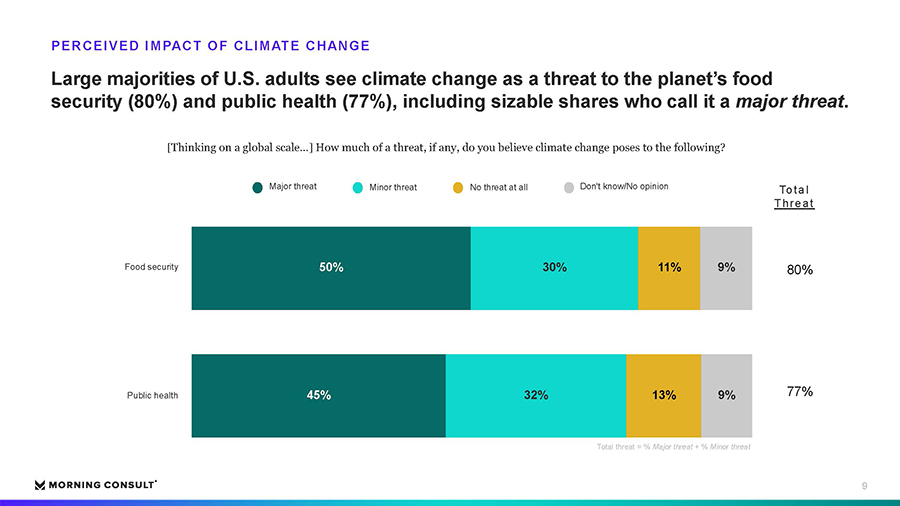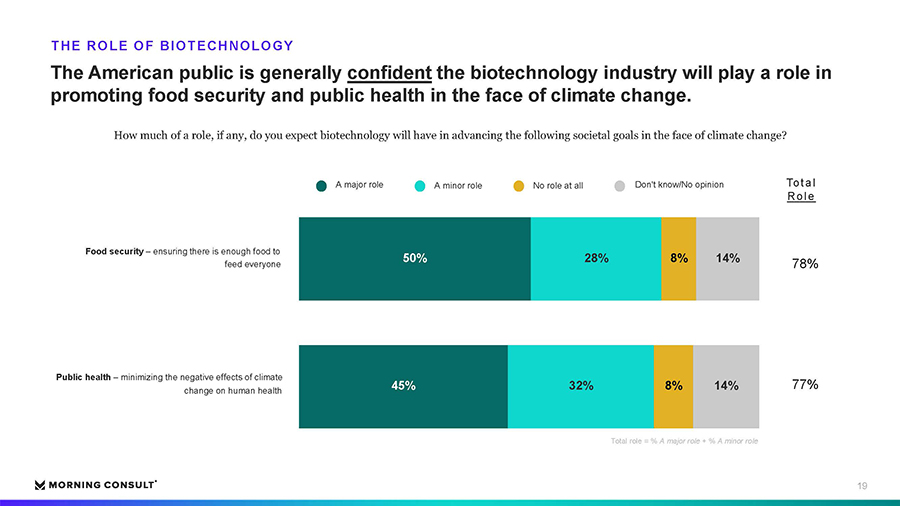As world leaders gather in Dubai to discuss solutions to the climate crisis at COP28, Americans are eager for decisive action. A poll published Dec. 7 finds they believe biotech should be supported as part of the climate solution.
More than 80% of respondents say climate change poses a threat to food security and public health, and 51% say not enough is being done to address the problem, according to a poll of 4,411 adults conducted by Morning Consult for Biotechnology Innovation Organization (BIO). The majority of those polled also believe biotechnology can help.
The poll indicates the American public is generally confident that the biotechnology industry will play a positive role in promoting food security (78%) and public health (75%) in the face of climate change. Federal policymakers should prioritize incentives for biotech companies to devote resources to solving the challenges brought by climate change, according to 66% of the respondents.
According to respondents, the top objectives being pursued by the biotech industry to address climate change are:
- Increasing overall food production (54%).
- Producing crops that can resist climate impacts (46%).
- Reducing deforestation (43%).
- Absorbing carbon dioxide (40%).

How biotech can address climate change
There appears to be growing appreciation of the many ways in which biotech can contribute to climate challenges. For example, about two in five U.S. adults report awareness of the biotechnology industry’s efforts to reduce methane gas emissions. Urbanites and adults under 45 are more aware than others.
Biotech solutions to reduce climate impacts include crops that are bioengineered to withstand harsh environments and rising pressure from pests and diseases; produce engineered to stay fresh longer and reduce food waste; alternatives to synthetic fertilizers; animal feed additives that support digestive efficiency and can reduce methane emissions; plant-based proteins that can help feed a growing world without growing our greenhouse gas emissions; and biobased fuels and other materials that can reduce carbon in the atmosphere.
“When you look at the many ways in which biotech companies are rising to the challenge of reducing and mitigating climate impacts, such as developing crop traits and plant-based materials to replace fossil resources, there is no question that biotech is ‘climate tech,’” says Beth Ellikidis, VP for Agriculture and Environment at BIO.

How action at COP28 can help biotech
World leaders at the COP28 United Nations Climate Change Conference must look at ways to reduce barriers to biotech innovations to increase food security and lower greenhouse gas emissions, says Ellikidis.
“Governments should work together to align regulatory policy with science and accelerate the development and adoption of biotech innovations,” according to Ellikidis. “Biotech companies are producing the tools to reduce, mitigate and adapt to climate change. They need regulatory systems that complement the speed of the innovation needed to meet this challenge.”
BIO is doing its part at COP28, cohosting two upcoming panels.
BIO will cohost the “Utilizing Biotechnology for Climate Resilience: Public Policy, Innovation and Global Impact” panel discussion together with the Inter-American Institute for Cooperation on Agriculture (IICA) on Sunday. Panelists include Anna Rath, president and CEO of Vestaron and chair of BIO’s Agriculture & Environment Section Board.
On Saturday, BIO, the International Chamber of Commerce, and the U.S. Department of Agriculture will cohost a session on “Reducing Methane from Food and Agriculture,” which will be moderated by Vestaron CEO Rath.




